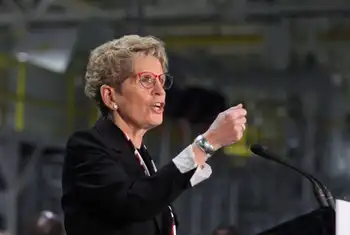Coal, price caps top Ontario minister's agenda
- Ontario's new energy minister says he runs his dishwasher less often now that he's taken over his new job, and he hasn't finished his personal conservation program yet.
"I'm going to get rid of the beer fridge pretty soon," Dwight Duncan said in an interview recently.
That would include both the one at home and the one in his office, which recently was sucking up power to cool a couple of bottles of juice and a few cans of cola.
While Duncan tries to persuade other consumers to root power-guzzling beer fridges out of basements across the province, he will be pushing residents of Ontario to install new electric meters that charge less money for power used overnight.
But first, the new energy minister is under the gun to produce a plan by the end of the month to remove the price cap that has kept the energy portion of the electricity bill at 4.3 cents a kilowatt hour for householders and small businesses.
And he has to meet a campaign promise to shut down Ontario's coal burning plants — which produce up to one-third of the province's electricity at times — by 2007.
The latest Liberal policy pronouncement has left him some wiggle room by saying the promise is only effective if new plants are in place to take up the slack.
"Clearly, our priority is to remove coal. That's Number 1," Duncan said recently. "I also want to move more quickly on alternative and green sources of energy."
While he talks conservation, getting new power sources is the uppermost issue on Duncan's mind.
"Every day when I leave here, I say to myself: Did I do anything to create new supply today?" he said.
That may be good news for nuclear power advocates, who would like to see more nuclear plants in Ontario.
"At this point, nobody's ruled anything in or anything out," he said.
"Our first priority is to get rid of coal. When you do the arithmetic, there is no bias against nuclear at this point."
Duncan said much more information should soon be forthcoming about the long delays and billion-dollar cost overrun in restarting the Pickering A nuclear station.
A panel headed by former federal energy minister Jake Epp has been probing Pickering A. Its final report will be in his hands by the end of this month, Duncan said. And he plans to make it available quickly to the public.
Duncan said he's "anxious to move forward" with plans to open up the provincial government's two big power companies — Ontario Power Generation (OPG) and Hydro One — to access to information requests.
The previous Conservative government exempted both companies from the access rules.
Duncan said his plan for phasing out the electricity price cap for consumers isn't finished yet, but hinted that it will likely be along the lines of the Liberals' election policy paper.
That suggested consumers could be charged a relatively modest rate for a certain basic amount of power, and a higher rate for power above the basic amount.
"Right within the price structure there will be incentives to conservation," he said.
Duncan said he wants to install "time-of-use" meters in the province that will allow consumers to get their power at a cheaper rate if they use it at off-peak periods, such as overnight or on weekends.
"We hope within the framework of the removal of the price cap there will be a very clear, not only signal but, incentive for time-of-use meters," he said. They won't be mandatory, but "we're certainly going to make it worth people's while."
Duncan says no decisions have been made on the future of OPG, including the proposal to break it into smaller operating units.
He wouldn't comment on the future of OPG chairman William Farlinger and its board of directors, but said its performance has been disappointing.
"Obviously no one's happy with the returns from that corporation over the last four years," Duncan said. "I have an obligation to ensure that this asset is being properly managed, and I'm looking at all those issues. And the finance minister's not too pleased with what's been going on."
OPG profits are supposed to help pay down the unfunded debt left by the former Ontario Hydro, currently $20.9 billion.
OPG's net income was $605 million in 2000, but it slid to $152 million in 2001 and $47 million last year.
Related News

Sask. Party pledges 10% rebate on SaskPower electricity bills
REGINA - Saskatchewan Party leader Scott Moe says SaskPower customers can expect a one-year, 10 per cent rebate on electricity if they are elected government.
Moe said the pledge aims to make life more affordable for people. The rate would apply to everyone, including residential customers, farmers, businesses, hospitals, schools and universities.
The plan, which would cost government $261.6 million, expects to save the average residential customer $215 over the course of the year and the average farm customer $845.
“This is a very equitable way to ensure that we are not only providing that opportunity for those dollars to go back…




